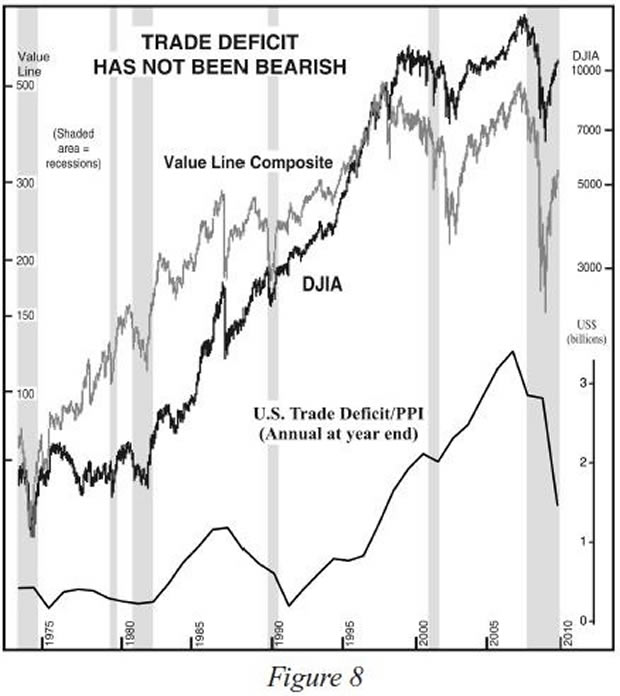U.S. Trade Deficit has NOT Been Bearish for Stocks - Investment Myths
Stock-Markets / Stock Markets 2014 Sep 05, 2014 - 10:59 AM GMTBy: EWI
 Interest rates, oil prices, earnings, GDP, wars, terrorist attacks, inflation, monetary policy, etc. -- NONE have a reliable effect on the stock market
Interest rates, oil prices, earnings, GDP, wars, terrorist attacks, inflation, monetary policy, etc. -- NONE have a reliable effect on the stock market
You may remember that during the 2008-2009 financial crisis, many called into question traditional economic models. Why did the traditional financial models fail?
And more importantly, will they warn us of a new approaching doomsday, should there be one?
That's a crucial question to your financial well-being. This series gives you a well-researched answer.
Here is Part III; come back soon for Part IV.
Myth #3: "Expanding trade deficit is bad for economy -- and bearish for stocks."
By Robert Prechter (excerpted from the monthly Elliott Wave Theorist; published since 1979)
Over the past 30 years, hundreds of articles -- you can find them on the web -- have featured comments from economists about the worrisome nature of the U.S. trade deficit. It seems to be a reasonable thing to worry about.
But has it been correct to assume throughout this time that an expanding trade deficit impacts the economy negatively?
Figure 8 answers this question in the negative:

In fact, had these economists reversed their statements and expressed relief whenever the trade deficit began to expand and concern whenever it began to shrink, they would have accurately negotiated the ups and downs of the stock market and the economy over the past 35 years. The relationship, if there is one, is precisely the opposite of the one they believe is there. Over the span of these data, there in fact has been a positive -- not negative -- correlation between the stock market and the trade deficit.
So the popularly presumed effect on the economy is 100% wrong. Once again, economists who have asserted the usual causal relationship neglected to check the data.
And it is no good saying, "Well, it will bring on a problem eventually." Anyone who can see the relationship shown in the data would be far more successful saying that once the trade deficit starts shrinking, it will bring on a problem.
Around 1998, articles began quoting a minority of economists who -- probably after looking at a graph such as Figure 8 -- started arguing the opposite claim. Fitting all our examples so far, they were easily able to reverse the exogenous-cause argument and have it still sound sensible. It goes like this:
In the past 30 years, when the U.S. economy has expanded, consumers have used their money and debt to purchase goods from overseas in greater quantity than foreigners were purchasing goods from U.S. producers. Prosperity brings more spending, and recession brings less. So a rising U.S. economy coincides with a rising trade deficit, and vice versa.
Sounds reasonable!
But once again there is a subtle problem. If you examine the graph closely, you will see that peaks in the trade deficit preceded recessions in every case, sometimes by years, so one cannot blame recessions for a decline in the deficit.
Something is still wrong with the conventional style of reasoning.
(Stay tuned for Part IV of this important series, where we examine another popular investment myth: Namely, that "Earnings drive stock prices.")
Free Report:
|
About the Publisher, Elliott Wave International
Founded in 1979 by Robert R. Prechter Jr., Elliott Wave International (EWI) is the world's largest market forecasting firm. Its staff of full-time analysts provides 24-hour-a-day market analysis to institutional and private investors around the world.
© 2005-2022 http://www.MarketOracle.co.uk - The Market Oracle is a FREE Daily Financial Markets Analysis & Forecasting online publication.




